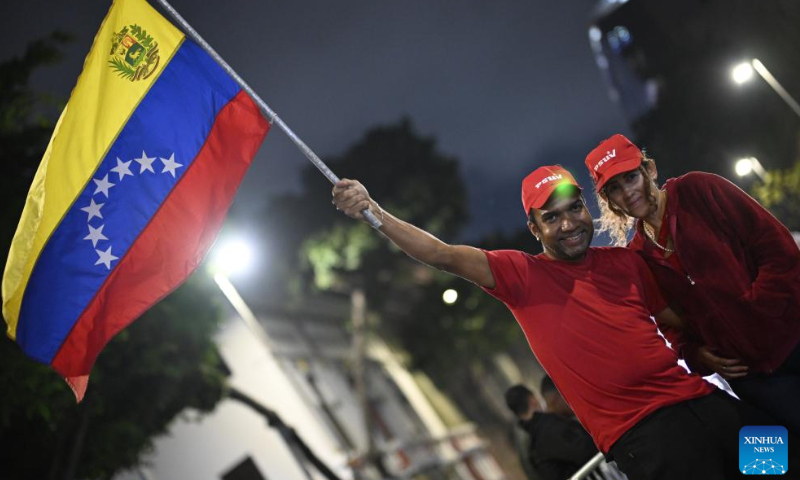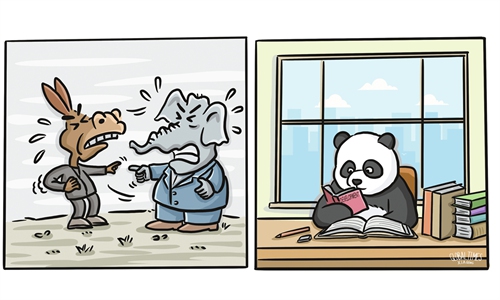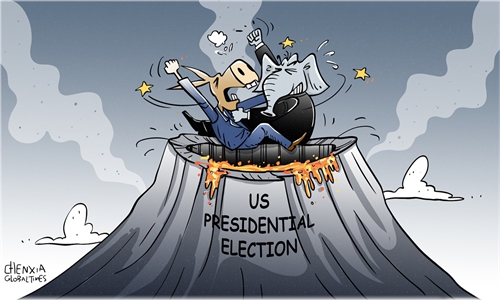
Venezuelan President Nicolas Maduro's supporters are pictured in Caracas, Venezuela, July 28, 2024. Photo: Xinhua
US Secretary of State Antony Blinken said on Monday that Washington has "serious concerns" about the announced results of Venezuelan presidential election won by incumbent President Nicolas Maduro, claiming it reflected "neither the will nor the votes of the Venezuelan people." Do American politicians know the will of the Venezuelan people better than the people themselves? Obviously not.
The US has significantly increased its interference in the affairs of Venezuela and other countries, attempting to reshape their political ecology through ideology. If a US-supported candidate wins an election, it will be described as fair and free; if not, it is labeled as unfair and lacking transparency. This tactic is a common method used by the US to interfere in the internal affairs of other nations.
The US incited Venezuela's opposition to refuse to recognize Maduro as the legitimate president of Venezuela in 2019. Because the US considers Latin America to be its backyard, any political force or figure that goes against the will or interests of American political elites will become a target of the US, like a thorn in its side.
The US policy toward Latin American countries fundamentally serves the interests of the US. As a result, the regimes of some Latin American countries backed by the US are completely disconnected from the interests of their peoples. The repeated occurrence of unrest in Latin America can also be attributed to US interventions, which violate the UN Charter and basic principles of international relations. These interventions undermine the sovereignty and interests of Latin American countries, including Venezuela, and pose a significant threat to peace and development in the region.
The US has long sought to prioritize its own geopolitical interests and values over international law. "Maduro insists on pursuing independence and resisting Venezuela becoming a puppet of other countries. However, the US takes it for granted that all countries in Latin America have no right to independence and must comply with US desires. The US justifies its interference in Latin American countries' internal affairs based on the so-called Monroe Doctrine, despite this doctrine being in conflict with international law," Li Haidong, a professor at the China Foreign Affairs University, told the Global Times.
During President Maduro's term, Venezuela has encountered severe sanctions from the US and some other Western countries, and was also threatened by military intervention. In April, the Biden administration even announced the reinstatement of some of the previously lifted sanctions, accusing President Maduro of failing to commit to free and fair elections. All these moves have exacerbated political and economic instability in Venezuela.
Noticeably, the intensity of US sanctions usually depends on American elites' assessment of the domestic situation of the sanctioned target. If the US intensifies sanctions, it means that the force or figure they oppose has become stronger, which also suggests that the US has less space to maneuver or subvert in Venezuela. If the US insists on its interference in Latin America and further undermine regional cooperation and development by abusing sanctions, its hegemonic behaviors will surely be increasingly criticized by countries in the region and the international community.
This election in Venezuela reflects the desire of people in developing countries for equality and justice to certain extent. The political and development direction of a country should be in the hands of its own people. Any external force, no matter how powerful, has no right to impose its own political standards on other countries.
China has congratulated Venezuela's successful presidential election and President Maduro's re-election on the same day. China's respect for independent elections stands in sharp contrast to the US' interference.
China emphasizes mutual benefits, mutual understanding and win-win results based on equality, while the US' policy toward Latin American countries is characterized by hegemony and interference in their internal affairs without a sense of equality. The US not only seeks economic and political dominance over Latin American countries but also uses military intimidation. China's relationship with Latin American countries, including Venezuela, is based on equality, mutual respect and win-win cooperation, while the US is seen as a bully creating subversion and chaos. It is clear that which kind of relationship is more favored by Latin American countries.
The author is a reporter with the Global Times. opinion@globaltimes.com.cn



